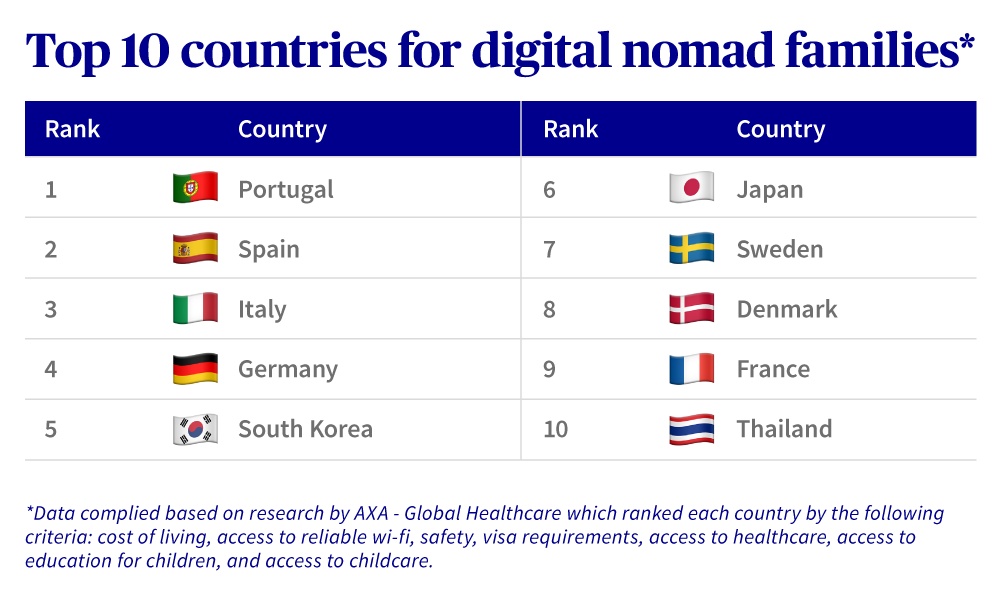New research highlights a shift towards remote work abroad with family in tow
For many, the concept of a digital nomad often brings to mind a young solo traveller, working remotely from picturesque destinations with nothing more than a laptop and an internet connection. However, a growing number of British families are now considering adopting this lifestyle together, embracing the idea of working remotely abroad while travelling with their loved ones.
According to new research commissioned by AXA Global Healthcare, a third (34%) of UK workers would contemplate relocating overseas for remote work, bringing their families along for the experience. This shift in mindset signals the rise of the ‘digital nomad family’ a trend that is reshaping how people perceive work-life balance, financial freedom, and personal growth.
The Key Drivers Behind Family-Based Digital Nomadism
The study found that for parents, the prospect of moving abroad for remote work is largely driven by the promise of an improved quality of life. Over three-quarters (76%) of respondents with children said they believed working remotely in another country would enhance their family’s well-being.
Financial factors also play a role in this emerging trend. More than half (56%) of parents surveyed said that working abroad would provide them with greater financial freedom. Many families see the opportunity to live in countries with a lower cost of living while still earning in a strong currency as a means to stretch their income further.
Additionally, the study found that one-third (33%) of parents believed that living and working abroad would strengthen family relationships and contribute to their overall personal growth. Exposure to new cultures, languages, and experiences can broaden a child’s worldview, fostering adaptability and resilience.
Challenges of the Digital Nomad Lifestyle for Families
While the idea of working remotely abroad presents exciting possibilities, there are also challenges that families must consider. Among the top concerns is access to education. Over two-fifths (41%) of parents surveyed said that having reliable schooling options for their children would be essential to successfully living and working abroad.
Childcare is another critical factor. More than a quarter (26%) of respondents with children highlighted the need for accessible childcare services to help them balance work commitments while adjusting to life in a new country.
Xavier Lestrade, CEO of AXA Global Healthcare, acknowledges these concerns: “As someone who has relocated across the world with my family for work, I understand the challenges parents face when considering an international move. Adjusting to a new environment, securing quality education, and ensuring healthcare access are all valid concerns. However, with the right planning, families can fully embrace the many benefits of the digital nomad lifestyle.”
Healthcare: A Top Concern for Nomadic Families
Healthcare remains one of the most significant considerations for families contemplating remote work abroad. A third (35%) of respondents listed access to quality healthcare as a top priority, while nearly three in five (59%) said they would require comprehensive medical insurance. Additionally, 29% of parents expressed a need for medical evacuation and repatriation services in case of emergencies.
Sebastian Judez, Global Head of Product and Proposition at AXA Global Healthcare, advises families to secure an international private medical insurance (IPMI) plan to ensure they have reliable healthcare coverage wherever they choose to live.
“The key to successfully embracing this lifestyle is preparation,” Judez explains. Having a comprehensive IPMI plan allows families to focus on enjoying their journey without the stress of unexpected medical costs or limited healthcare options.
Top Countries for Digital Nomad Families
To support families exploring this lifestyle, AXA – Global Healthcare has developed a Digital Nomad Index, ranking the best destinations based on cost of living, reliable Wi-Fi, safety, visa regulations, education, childcare, and healthcare access.
For families eager to take the leap into digital nomadism, careful planning and the right resources can make the dream of working remotely abroad a reality.
